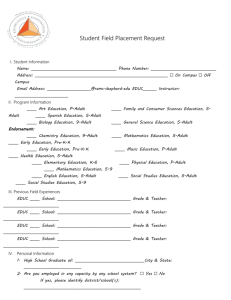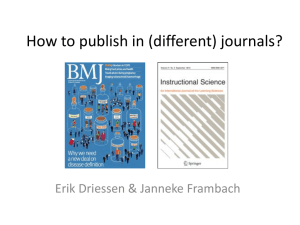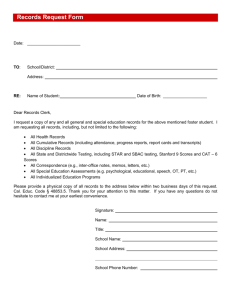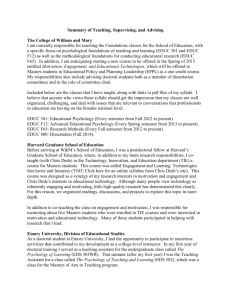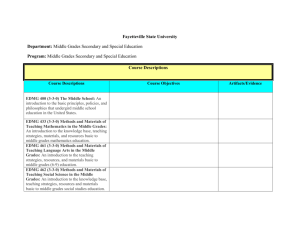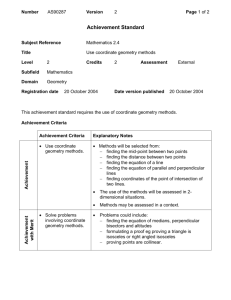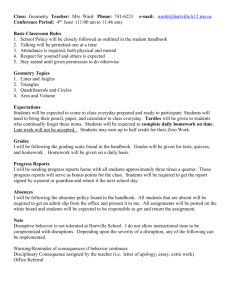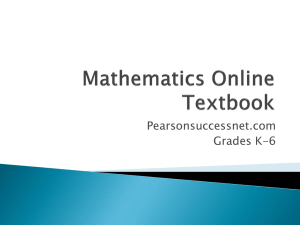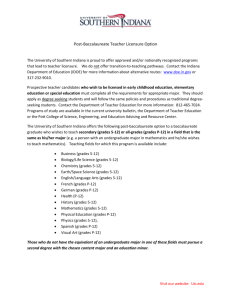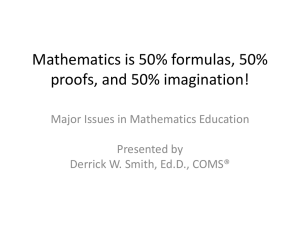EDUC 2217 - Science and Math Experiences
advertisement
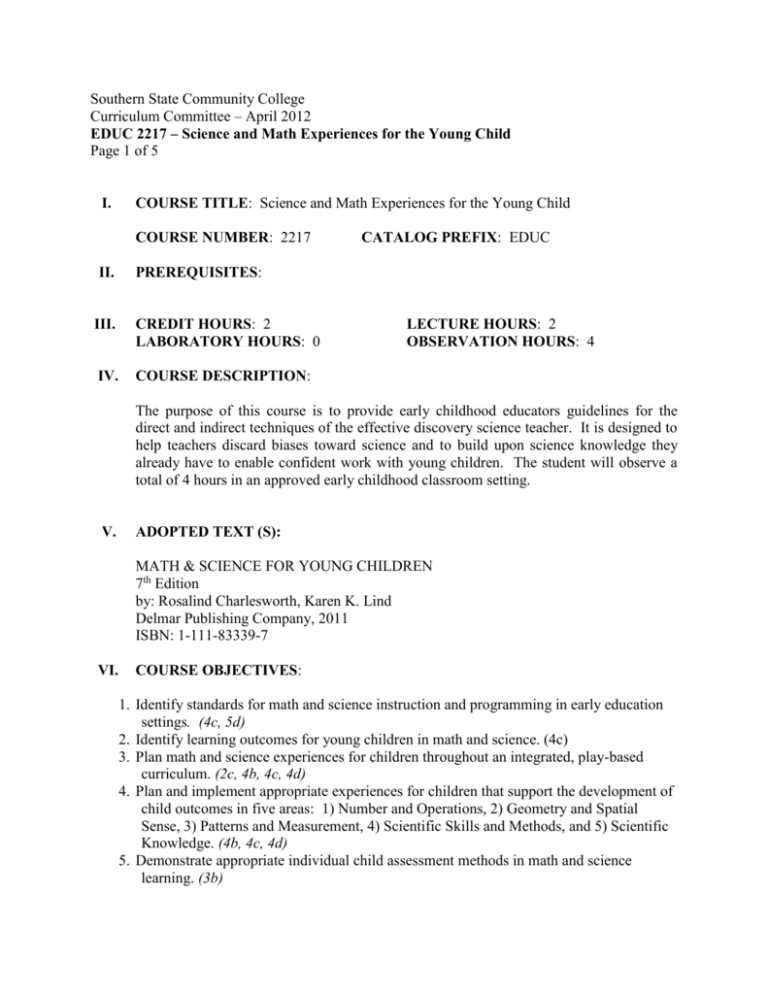
Southern State Community College Curriculum Committee – April 2012 EDUC 2217 – Science and Math Experiences for the Young Child Page 1 of 5 I. COURSE TITLE: Science and Math Experiences for the Young Child COURSE NUMBER: 2217 II. CATALOG PREFIX: EDUC PREREQUISITES: III. CREDIT HOURS: 2 LABORATORY HOURS: 0 IV. COURSE DESCRIPTION: LECTURE HOURS: 2 OBSERVATION HOURS: 4 The purpose of this course is to provide early childhood educators guidelines for the direct and indirect techniques of the effective discovery science teacher. It is designed to help teachers discard biases toward science and to build upon science knowledge they already have to enable confident work with young children. The student will observe a total of 4 hours in an approved early childhood classroom setting. V. ADOPTED TEXT (S): MATH & SCIENCE FOR YOUNG CHILDREN 7th Edition by: Rosalind Charlesworth, Karen K. Lind Delmar Publishing Company, 2011 ISBN: 1-111-83339-7 VI. COURSE OBJECTIVES: 1. Identify standards for math and science instruction and programming in early education settings. (4c, 5d) 2. Identify learning outcomes for young children in math and science. (4c) 3. Plan math and science experiences for children throughout an integrated, play-based curriculum. (2c, 4b, 4c, 4d) 4. Plan and implement appropriate experiences for children that support the development of child outcomes in five areas: 1) Number and Operations, 2) Geometry and Spatial Sense, 3) Patterns and Measurement, 4) Scientific Skills and Methods, and 5) Scientific Knowledge. (4b, 4c, 4d) 5. Demonstrate appropriate individual child assessment methods in math and science learning. (3b) Southern State Community College Curriculum Committee – April 2012 EDUC 2217 – Science and Math Experiences for the Young Child Page 2 of 5 VII. COURSE METHODOLOGY At discretion of instructor, but may include lecture, project-based learning, synthesis, discussion, Socratic Method, or other methodologies. VIII. GRADING: 90-100% - A 80-89% - B 70-79% - C 60-69% - D 0-59% - F IX. COURSE OUTLINE: Week 1 - Introductions, Technology Overview, Portfolio Initiation, NAEYC Discussion Week 2 – Section 1 – Concept Development in Mathematics and Science Unit 1 How Concepts Develop Unit 2 – How Concepts Are Acquired Unit 3 – Promoting Yong Children’s Concept Development Through Problem Solving Week 3 – Section 1 – Concept Development in Mathematics and Science Unit 4 – Assessing the Child’s Developmental Level Unit 5 – The Basics of Science Unit 6 – how Young Scientists Use Concepts Unit 7 – Planning for Science Week 4 – Section 2 – Fundamental Concepts and Skills Unit 8 – One-to-one Correspondence Unit 9 – Number Sense and Counting Unit 10 – Logic and Classifying Unit 11 – Comparing Week 5 – Section 2– Fundamental Concepts and Skills Unit 12 – Early Geometry: Shape Unit 13 – Early Geometry: Spatial Sense Unit 14 – Parts and Wholes Unit 15 – Language and Concept Formation Southern State Community College Curriculum Committee – April 2012 EDUC 2217 – Science and Math Experiences for the Young Child Page 3 of 5 Unit 16 – Fundamental Concepts in Science Week 6 – Section 3 – Applying Fundamental Concepts, Attitudes, and Skills Unit 17 – Ordering, Seriation, and Patterning Unit 18 – Measurement: Volume, Weight, Length, and Temperature Unit 19 – Measurement: Time Week 7 – Section 3– Applying Fundamental Concepts, Attitudes, and Skills Unit 20 – Interpreting Data Using Graphs Unit 21 – Applications of Fundamental Concepts in Preprimary Science Unit 22 – Integrating the Curriculum through Dramatic Play and Thematic Units Week 8 – Lesson Plan Creation and Presentation Week 9 – Section 4 – Symbols and Higher-Level Activities Symbols Groups and Symbols Week 10 – Section 4– Symbols and Higher-Level Activities Higher-Level Activities Higher-Level Activities Used in Science Units and Activities Week 11 – Section 5 – Mathematics Concepts and Operations for the Primary Grades Unit 27 – Operations with Whole Numbers Unit 28 – Patterns Unit 29 – Fractions Unit 30 – Numbers above Ten and Place Value Unit 31 – Geometry, Data Collection, and Algebraic Thinking Unit 32 – Measurement with Standard Units Week 12 – Section 5– Section 5 – Mathematics Concepts and Operations for the Primary Grades Unit 30 – Numbers above Ten and Place Value Unit 31 – Geometry, Data Collection, and Algebraic Thinking Unit 32 – Measurement with Standard Units Week 13 – Section 6 – Using Skills, Concepts, and Attitudes for Scientific Investigations in the Primary Grades Unit 33 – Overview of Primary Science Unit 34 – Life Science Unit 35 – Physical Science Southern State Community College Curriculum Committee – April 2012 EDUC 2217 – Science and Math Experiences for the Young Child Page 4 of 5 Week 14 – Section 6 – Using Skills, Concepts, and Attitudes for Scientific Investigations in the Primary Grades Unit 36 – Earth and Space Science Unit 37 – Environmental Awareness Unit 38 – Health and Nutrition Week 15 – Section 7 – The Math and Science Environment Unit 39 – Materials and Resources for Math and Science Unit 40 – Math and Science in Action Unit 41 – Math and Science in the Home Week 16 - Finals X. OTHER REQUIRED BOOKS AND MATERIALS: None XI. EVALUATION: At the discretion of instructor XII. SPECIFIC MANAGEMENT REQUIREMENTS: STATEMENT ON ACADEMIC HONESTY Southern State Community College is committed to providing educational opportunities that promote academic, professional, and personal growth in students. To these ends, all members of the college are expected to up hold the highest academic and ethical standards. Academic misconduct cannot be tolerated. XIII. OTHER INFORMATION: FERPA: Students need to understand that your work may be seen by others. Others may see your work when being distributed, during group project work, or if it is chosen for demonstration purposes. Students also need to know that there is a strong possibility that your work may be submitted to other entities for the purpose of plagiarism checks. DISABILITIES: Students with disabilities may contact the Disabilities Service Office, Southern State Community College Curriculum Committee – April 2012 EDUC 2217 – Science and Math Experiences for the Young Child Page 5 of 5 Central Campus, at 800-628-7722 or 937-393-3431.
